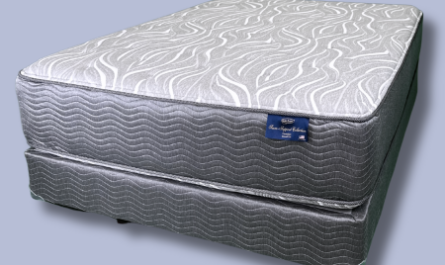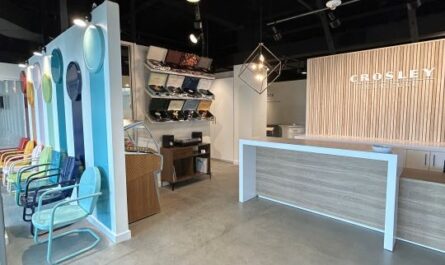Company president and CEO follows in his father John Foster’s footsteps to help the case goods resource thrive in the years ahead
HIGH POINT — When his father John Foster passed away in August 2014, Chuck Foster had a life-changing decision to make.
That decision was whether to follow in his father’s footsteps by taking on the leadership of the company Foster had started about 17 years before, Rockford Furniture.
It would involve Foster engaging in the business — Rockford and sister bedroom furniture resource American Woodcrafters — on a whole new level. Instead of just helping source and develop product as he had done in years prior, he would be in charge of helping steer the companies forward and thus shaping their future for employees and customers alike.
Chuck Foster wasn’t a stranger to leadership at the company. Just a few months before his father died, he had already been named president, while his father remained CEO and Chairman and Chris Coggins, a long-time partner in the business, remained chief financial officer.
But taking over the company entirely was something different.
“Dad had gotten diagnosed with leukemia and had been diagnosed for a while,” Chuck Foster told Home News Now. “But when he really got sick and the doctors were at the point where there wasn’t any more they could do, I was disenchanted with some of the things that were going on and I was kind of in my mid-life crisis zone in my late 40s and early 50s. I was trying to figure out what I wanted to do.”
“And the company didn’t have a lot of cash flow at the time and didn’t have a lot of cash availability,” he added, noting that while the company had good retail partners, “I wasn’t sure I wanted to dedicate my time to it. We looked at selling the company, and all our representatives knew that and some of our customers knew it.”

But a year and a half to two years in, he said that he came to the realization that he wanted to devote himself fully to the business, working alongside his business partner Coggins to make the company a success moving forward.

“The main ownership of the company had transferred to my family’s estate, although Chris Coggins and I are partners in the business outside of that, and the two of us have really made this company — in my mind, and since Dad passed — what it is today. We also have had support from a board that consists of some outside people and some family members to give us some direction.”
Foster also credited Rusty Morris, vice president, sales and marketing, for his involvement and leadership on the revenue and business development side.
Yet perhaps as much as anything, Foster’s education in fine arts and his talent as a sculptor also have helped bring a creative vision to the company, steering it in a design direction it might not have gone previously.
At Flagler College, Foster studied to be an artist, honing his passion for sculpture into more than 200 creations over the years. He even spent summer months in Italy where he stayed at the home of his mentor and got to visit parts of Italy where Michelangelo got his stone to carve some of his most famous works.
“I was really passionate about my fine arts at that point,” he said. “And coming out of college, I wanted to be a sculptor and show in museums and have my work displayed. But I think pretty quickly, I realized that based on what you had to do, it was hard to be an artist and just follow your passion and make enough money unless you had a real backer to fund it.”

John Foster did fund his son for a couple of years out of school. And while this resulted in some prolific work including sculptures seen around High Point, Richmond Virginia, and parts of Florida, the younger Foster said he eventually needed what he and his wife Kim call a “real job” to support his family.
After that realization, he went to work selling stone to the furniture industry for North Carolina Granite Corp. During that period, he realized he also had an appreciation for wood product. While not the same as carving stone, he said, this ultimately tapped into a big part of his creative side.
“I realized my creative side played a big part in helping me to develop product,” he said. “With the help of Tom Keller (H. Thomas Keller) & Associates and some of the other design community, I could take their designs and turn them into a three-dimensional piece of furniture. And in the background, I was also doing a lot of carving of legs and was partnering with other carvers and taking what they did well and bringing in what I did well and creating pieces for companies like Century Furniture and Henredon.”
Foster admits he’s not good with specific dates, but estimates he worked for his father for at least 10, if not 15 years before he died. This would have had him working at American Woodcrafters and parent company Rockford Furniture starting in the early 2000s, around the time imports became much more commonplace in the furniture business.
On the development and sourcing side of the business, Chuck Foster traveled extensively to places like, Taiwan, China, Indonesia, Brazil and also Chile, where the company had a business partnership with a vertically integrated manufacturer called Copihue.

While this partnership eventually dissolved when Copihue was sold to a larger corporate entity, it resulted in the creation of American Woodcrafters. Today, Rockford Furniture, Rockford International and American Woodcrafters are all part of American Woodcrafters.
Foster’s travels would take him overseas for six months at a time, which didn’t end up making good on his father’s promise of having an easier life in the furniture industry. But this is where he got to know and develop relationships with many producers overseas, as well as ones the company works with today in Indonesia — where it produces its case goods line — and Vietnam, where it produces barstools.
“I learned a lot under the fire of being involved in that side of it. And even with my fine arts background, I loved the process of it,” he said of finding materials including mixed media elements such as stone and “figuring out what I could do with it. So in that sense, the manufacturing side was fascinating to me even though I didn’t have a tremendous amount of experience in it.”
Jeff Holmes, a former president of American Drew, knew John Foster for many years including when Foster served as president of sister company Lea Industries. He and his wife also socialized on occasion with Foster and his wife Louise Lewis Foster, a daughter of the Flagler family.
“What a creative talent he was,” he said of John Foster. “His son became a sculptor and had the same talent in a much more marketable package than John ever thought of being. He got the creativity and innovative brain power from his dad and he got the business sense from his mom. What a combination.”
Holmes said that in the years since his father passed, Chuck Foster has not only sustained the business, but has grown the business into what it is today.
Since its inception, American Woodcrafters has largely focused on master and youth bedroom and has been known over the years for its cottage-inspired designs in that category. But more recently, the company has further broadened its style palette in more transitional designs, something that Foster believes has widened the net in terms of its customer base.

It also has gotten into the dining category which helps the company sell collections of bedroom and dining for customers wanting to shop a single resource for both. As a mid-priced resource, its bedrooms retail around $2,500 for a bed dresser and mirror, while dining sets featuring a table and four chairs are targeted to retail around, $2,000. A table and a table and six chairs are targeted to retail around $2,600.
“We have now developed a couple of dining rooms that have come on board, and we are going to see how that works for us,” Foster said, noting that the program started development about two years ago and that the first sets shipped a few months ago from Indonesia. “And we did that not with the thought that we want to be a cheap dining room producer. We want to be more of a collection based company.”
“We knew Malaysia and Vietnam had some cheap chairs and did some things that were less expensive, but we wanted to have a more cohesive program for our dealers,” he added of the company’s decision to source the line, along with its bedroom program, in Indonesia. “At the same time we are working with our factories to be able to do some mixing of product and storing of a little bit of goods overseas…And we have a nice group of container customers that are able to mix a little bit of product and flow that product.”
Of his passion for sculpture, Foster said he doesn’t think he will get back into that pursuit anytime soon. But he still plans to use his creative abilities to help further develop the American Woodcrafters line in a meaningful way for his customers.
“I have to remember that I can’t be creative beyond the scope of who the company is, although I do like to push the limits a little bit,” he said. “It’s just that my creativity wants me to go there. But I don’t think we are doing anything tremendously unique. We are just trying to fit into the middle portion of the needs for the country and the areas we service. But yeah, the creative side is what I love doing.”




